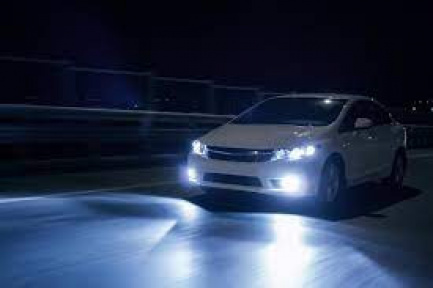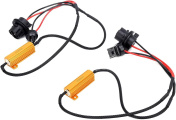
In general, headlights and their lifespan are determined by how well they are made and how often they are used. Headlights that are constantly exposed to the elements will degrade faster than those that aren't, but even the best-made headlights will eventually need to be replaced. So, what lifespan should be for a good xenon headlight?
How long do xenon bulbs last?

Some experts say that a good xenon bulb should last between two and five years. However, this estimate depends on how often you use your headlights. If you only use your headlights occasionally, they may last much longer than five years. On the other hand, if you use your headlights all the time, they may only last a couple of years.
So, with an average lifespan of 10,000 hours, a xenon headlight should last between two and five years. However, this estimate depends on how often you use your headlights. If you only use your headlights occasionally, they may last much longer than five years. On the other hand, if you use your headlights all the time, they may only last a couple of years.
While it is true that constant use will shorten their lifespan, it is still better than not using them at all. This is because headlights that are constantly exposed to the elements will degrade faster than those that aren't. So, if you can't help but use your headlights all the time, don't worry too much about it - they'll still last longer than if you never used them at all.
Are xenon bulbs better than HID or LED?
The xenon technology in headlights has come a long way since its inception in the early 2000s. Many carmakers have made the switch to using xenon headlights, and they’ve become increasingly popular in aftermarket applications as well.
These bulbs are usually advertised as being brighter and whiter than traditional halogen bulbs, and they do indeed produce a light that is closer to natural sunlight. This makes for better visibility on the road, especially in low-light conditions. Xenon headlights are also more energy-efficient than traditional halogen bulbs, which means they put less strain on your car's electrical system. And since they last longer than halogen bulbs, you'll save money in the long run by not having to replace them as often.
At the same time, LED lights are becoming more and more popular in headlights. LEDs are even more energy-efficient than xenon bulbs, and they last even longer. They also produce a light that is very close to natural sunlight, making for excellent visibility on the road. Many carmakers are now offering LED headlights as an option on their vehicles, and it's likely that they will eventually become the standard.
Halogen headlights are still the most common type of headlight, but xenon and LED headlights are slowly taking over. If you're looking for the best possible visibility on the road, LED headlights are the way to go. But if you're looking for a more affordable option that still offers good visibility, xenon headlights are a good choice.
So, if you're looking for a bulb that will give you better visibility and last longer, xenon is the way to go. However, if you're on a tight budget, halogen bulbs are still a good option.
What affects xenon headlights lifespan?
There are a lot of factors that may have an impact on the headlights` life length.

- Type of the car: some cars are designed in a way that makes the headlight harder to replace. This might cause difficulties when you will want to change them and could even lead to a shorter lifespan.
- The material they are made of: nowadays, there are different materials used for headlights (xenon, halogen, LED). Each type has its own lifespan.
- How often do you use them: as we have seen before if you use your headlights all the time, they will probably not last as long as if you only use them occasionally.
- The environment they are in: if you live in an area with a lot of dust or pollen, your headlights will probably get dirty faster and will need to be cleaned more often. This will lead to a shorter lifespan.
- The temperature: extreme temperatures (too hot or too cold) can also affect the lifespan of your headlights.
- How well you take care of them: if you don't clean your headlights regularly, they will get cloudy and yellow over time. This will make them less effective and will shorten their lifespan.
As you can see, there are many factors that can affect the lifespan of your headlights. However, if you take good care of them and use them properly, they should last for many years.
How can you expand the lifespan?
Drivers can definitely make their headlights last longer by following some simple steps.
- Regularly clean your headlights to prevent them from getting cloudy or yellow: When drivers don't clean their headlights, a build-up of grime can cause the light to scatter and become less effective. This will shorten the lifespan of your headlights.
- Don't use them all the time: If you only use your headlights when it's absolutely necessary, they will last longer.
- Avoid extreme temperatures: Extreme temperatures can damage your headlights and shorten their lifespan because the material they are made of can expand or contract.
- Follow the manufacturer's recommendations: When you buy a new car, the manufacturer will usually have a recommendation for how often to change your headlights. Following this recommendation will help to ensure that your headlights last as long as possible.
By following these simple steps, you can make your headlights last longer and ensure that you have the best possible visibility on the road.
How often should you replace xenon bulbs?
We've compared the light output of new versus four-year-old bulbs, and we can see a significant drop in light output. Based on this as well as other studies, we recommend that technicians advise customers to change xenon HID bulbs every three years.
That is because many xenon headlights are not properly sealed and allow moisture to enter the bulb. Once moisture is present, it quickly damages the fragile filament inside the bulb, causing it to lose its brightness. If you want your headlights to last as long as possible, we recommend changing them every three years. However, if you are on a tight budget, halogen bulbs are still a good option.

Xenon headlights are typically more expensive than traditional halogen bulbs, but they offer superior visibility and a longer lifespan. If you take good care of your headlights and use them properly, they should last for many years. However, if you're on a tight budget, halogen bulbs are still a good option.
Do xenon headlights burn out?
Xenon lights don't burn out like filament bulbs, so they don't go through the same burning-out cycle. They waste away and die gently over time. Even filament lamps have a burn-in period - albeit shorter than for xenon - during which luminous flux and crucial luminance rise modestly.
Besides, it is not easy to find a spot on the headlight where the light can be focused. So, it is hard to produce a powerful and concentrated beam of light using xenon headlights. This is why most carmakers use halogen bulbs for high beams and reserve xenon only for low beams.
Some of the main reasons for why xenon bulbs may die before their time are:
- Poorly designed lights: Many of the cheaper xenon headlights on the market are poorly designed and don't provide adequate cooling for the bulbs. This can cause the bulbs to overheat and fail prematurely.
- Improper installation: If Xenon headlights are not installed properly, they can damage the bulbs or cause other problems that will shorten their lifespan.
- Using the wrong power supply: Using an incorrect power supply can damage the bulbs and cause them to fail prematurely.
All of these factors can cause your xenon headlights to die before their time. If you want your headlights to last as long as possible, make sure you buy a quality product and have them installed properly.
How do you tell if a xenon bulb is burnt out?
OK, but what if you don`t know what are the signs of a bulb going bad? You can tell that a xenon bulb is burnt out if:
- The light is dimmer than usual
- The beam is not as sharp as it used to be
- There are dark spots in the beam
- The light is flickering or flashing
- The bulb makes strange noises
If you notice any of these signs, it's time to replace your xenon bulbs. The process is pretty easy if you are a DIYer, but we recommend taking your car to a professional if you are not comfortable doing it yourself.

So, in order to replace the xenon headlight bulb you should:
- Turn off the engine and let the bulb cool down
- Remove the old bulb
- Take the new bulb out of the packaging
- Install the new bulb
- Test the new bulb
- Put everything back together
It is important to follow these steps carefully in order to avoid damaging the new bulb or causing other problems. If you are not comfortable doing it yourself, we recommend taking your car to a professional.
Xenon headlights are a great way to improve your visibility on the road and make your car look more stylish. However, they can be expensive and they don't last forever. If you take good care of your headlights and use them properly, they should last for many years. However, if you're on a tight budget, halogen bulbs are still a good option.
Bottom line
So, now you know that xenon headlights last up to 10,000 hours and that you can tell when they are going bad. If you take good care of your headlights and use them properly, they should last for many years. However, if you're on a tight budget, halogen bulbs are still a good option.








